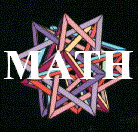
| Math Teaching Philosophy |  |
Some of what I have to say on this subject is original thinking, but much of it is paraphrased/quoted from a Newsweek article, by Evan Keliher. Mr. Keliher is a thirty-year veteran of public school classrooms.
There has never been an educational innovation or reform that has resulted in students learning more, faster, or better. That's not to say that there are not a lot of reforms in place in schools, it's just to say that they do not accomplish anything over the long haul. In the short term most reforms have some positive impact, but that is only because there are many more people, more money, and more time involved in a small, select situation. When the reforms are forced on teachers in classrooms they just don't improve the teaching - learning situation.
Nothing will ever be able to attain better results in the classroom than a knowledgeable, motivated teacher working at a chalkboard in front of a class of willing, eager learners. If you want to help students learn you need only give them a reason to learn, not much else matters. We can look at the poorest schools in the poorest countries on Earth and see learning taking place under the most dreadful conditions imaginable.
Nothing has changed since Ptolemy I, the king of Egypt, asked Euclid to teach him geometry. The king was advised that he would have to study long hours and memorize a big math book. Pharaoh demanded a shortcut as he did not want to do all the work involved in learning geometry. Euclid's response was that there is no royal road to geometry. (There wasn't a shortcut to learning then and there still isn't.
We know that educational reforms do not work because after implementing reforms over many years we have seen no positive results. We should stop using children as lab rats and use more traditional methods of teaching. In addition, we need to realize that increased self-esteem can never come from patronizing our students with glowing remarks over mediocre work.
The only way to produce a literate, numerate work force is to foster confidence in our students by providing them with real skills in Reading, Writing, Social Studies, Science, and Mathemetics. One model that incorporates this idea is direct instruction.
Every minute that teachers spend on misguided educational strategies is time that they could have invested in teaching useful academics.
*The only place achievement comes before effort is in the dictionary.